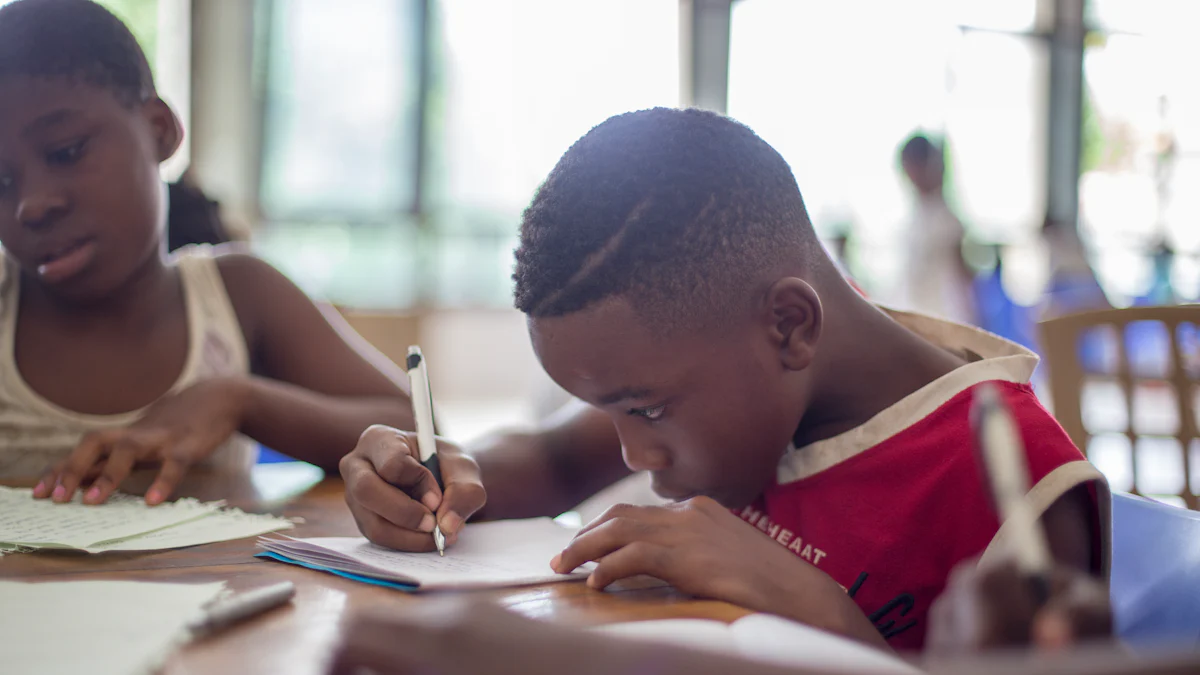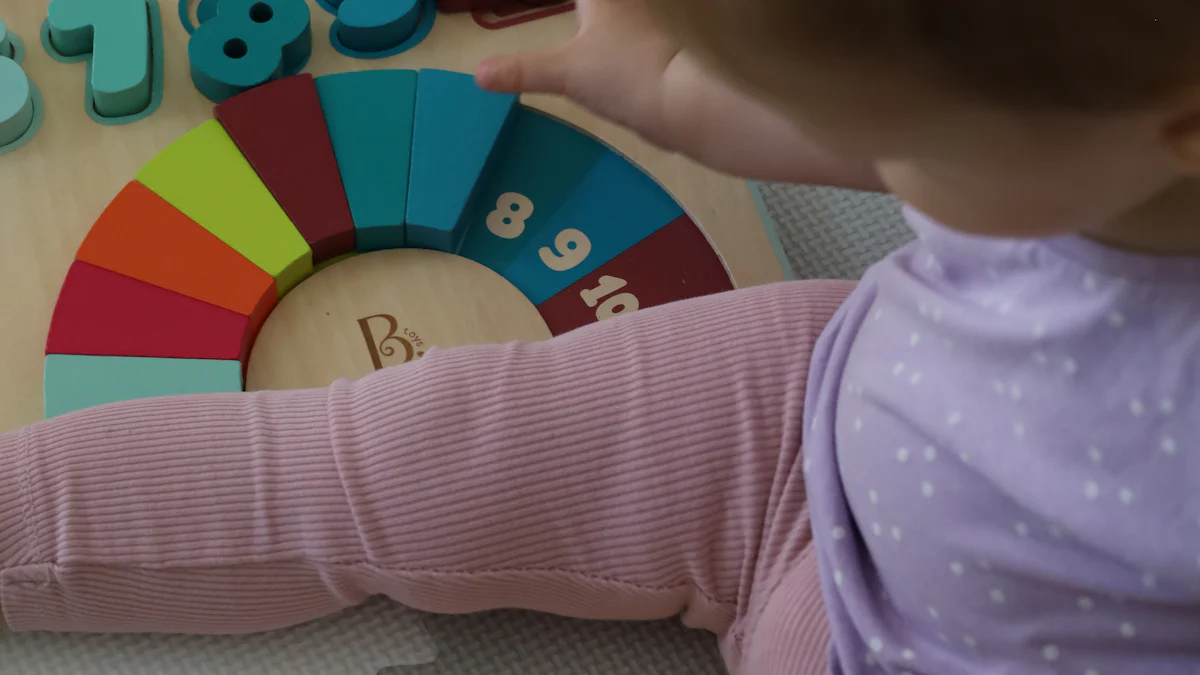The Benefits of Letting Kids Solve Their Own Problems

Problem-solving is important in child development. Kids learn to tackle challenges and think critically. This skill builds confidence and independence. The benefits of letting kids solve their own problems include resilience and self-reliance. Kids face manageable stress, which promotes growth. Parents play a vital role. Support from adults helps kids navigate these experiences. Encouraging this approach fosters important skills. Parents can guide children without solving every issue for them. This support empowers kids to become capable problem solvers.
Benefits of Letting Kids Develop Problem-Solving Skills
Encouraging Critical Thinking
Critical thinking is a big deal for kids. When kids face problems, they learn to think deeply. This skill helps kids in school and life. Kids start by analyzing situations.
Analyzing Situations
Kids look at problems from different angles. They ask questions like, "What's really going on?" or "Why did this happen?" Kids learn to break down complex issues. This process helps kids understand the root of a problem. Kids become detectives in their own lives.
Exploring Multiple Solutions
Kids don't stop at one answer. Kids brainstorm multiple solutions. This approach teaches kids flexibility. Kids learn that there's more than one way to solve a problem. Kids become creative thinkers. Kids gain confidence in their ability to tackle challenges.
Learning from Mistakes
Mistakes are part of life. Kids learn a lot from them. Mistakes teach kids valuable lessons. Kids learn to see mistakes as opportunities.
Understanding Consequences
Kids realize that actions have consequences. Kids understand that choices lead to outcomes. This understanding helps kids make better decisions in the future. Kids learn responsibility through experience.
Adjusting Strategies
Kids become more resilient. Kids develop a mindset that embraces change.
Letting Your Child Solve Problems to Foster Independence
Fostering independence in children is crucial for their growth. Letting your child solve their own problems plays a big role in this process. Kids learn to rely on themselves and make decisions. This builds confidence and prepares them for future challenges.
Building Self-Reliance
Self-reliance is a key part of child development. Kids gain this skill by making decisions and taking responsibility.
Making Decisions
Kids face choices every day. Letting your child solve these decisions helps them grow. Kids learn to weigh options and consider outcomes. This practice strengthens cognitive skills and boosts confidence. Children develop problem-solving skills that serve them well in life.
Taking Responsibility
Taking responsibility is essential for self-reliance. Kids learn that actions have consequences. Letting your child solve their own issues teaches accountability. This approach aligns with the Love and Logic process. Kids become more aware of their impact on others. This understanding builds maturity and independence.
Encouraging initiative helps kids pursue their interests. Encouraging initiative helps kids set personal goals and work towards them. This process enhances cognitive skills and fosters creativity.
Encouraging initiative helps kids pursue their interests. Kids set personal goals and work towards them. This process enhances cognitive skills and fosters creativity.
Setting Personal Goals
Setting goals gives kids direction. Letting your child solve their own problems encourages goal-setting. Kids learn to plan and prioritize. This skill supports academic performance and personal growth. The Parent Encouragement Program highlights the importance of goal-setting in child development.
Pursuing Interests
Pursuing interests fuels passion and curiosity. Kids explore hobbies and activities they love. Letting your child solve their own challenges in these areas builds resilience. This approach nurtures creative problem-solving skills. Kids develop communication skills and cognitive abilities through exploration.
The Love and Logic parents understand the value of letting kids tackle problems. This method builds independence and confidence. Kids learn to navigate life's ups and downs with grace. The Love and Logic philosophy, supported by Lynne TicknorDecember, emphasizes the importance of this approach.
Letting your child solve their own problems is a gift of love. Kids become capable, confident, and resilient individuals. This journey strengthens cognitive skills and prepares them for the future.
Building Confidence Through Problem Solving

Overcoming Challenges
Kids face challenges every day. Tackling these challenges builds confidence. Kids learn to trust themselves. This trust grows with each success and failure. Kids become more resilient. Confidence shines through when kids overcome obstacles.
Celebrating Successes
Success feels great, right? Kids need to celebrate their wins. These celebrations boost self-esteem. Kids feel proud of their achievements. Every small victory matters. Kids gain motivation to tackle bigger challenges. Celebrating success creates a positive cycle.
Learning from Failures
Failure teaches valuable lessons. Kids learn to embrace mistakes. Each mistake offers a chance to grow. Kids develop resilience by bouncing back. Confidence builds when kids learn from failures. Kids understand that setbacks are part of life. Embracing failure leads to personal growth.
Developing Self-Esteem
Self-esteem plays a big role in a child's life. Kids with high self-esteem feel good about themselves. Problem-solving boosts self-esteem. Kids learn to value their efforts. Confidence grows as kids recognize their achievements.
Recognizing Achievements
Recognizing achievements is crucial. Kids need to see their progress. Acknowledging accomplishments builds confidence. Kids feel valued and appreciated. Recognition encourages kids to keep trying. Kids learn that hard work pays off.
Valuing Effort
Effort matters more than the outcome. Kids learn to appreciate their hard work. Valuing effort boosts self-esteem. Kids understand that trying is important. Effort leads to improvement and growth. Kids gain confidence by valuing their dedication.
Enhancing Resilience by Solving Their Own Problems
Coping with Setbacks
Kids face setbacks all the time. Learning to cope with these challenges builds resilience. Kids develop skills that help them handle life's ups and downs.
Managing Emotions
Managing emotions is key. Kids learn to recognize feelings like frustration or disappointment. Understanding emotions helps kids respond calmly. Emotional control leads to better decision-making. Kids gain confidence in handling tough situations.
Developing Perseverance
Perseverance means not giving up. Kids learn to keep trying even when things get hard. This attitude builds strength and determination. Kids discover that effort leads to progress. Perseverance helps kids achieve their goals.
Adapting to Change
Change happens often. Kids need to adapt to new situations. Flexibility and openness make this process easier.
Embracing Flexibility
Flexibility allows kids to adjust. Kids learn to accept different outcomes. This skill helps kids navigate unexpected changes. Flexibility encourages creative problem-solving. Kids become more adaptable in various situations.
Learning New Skills
New skills open doors. Kids gain knowledge by trying new things. Learning builds confidence and competence. Kids feel empowered when mastering new tasks. Skill development prepares kids for future challenges.
"Resilience is built through supportive relationships and adaptive skills."
Strong connections with adults help kids thrive. Encouragement and guidance foster resilience. Kids learn to overcome adversity with support.
Encouraging Parental Support in Problem Solving
Parents play a crucial role in helping kids become problem solvers. Creating a supportive environment is key. Kids need guidance and encouragement to tackle challenges. Parents can use tools like the Adventurer Play Kit and Babbler Play Kit to foster these skills. These kits offer interactive ways for kids to explore problem-solving.
Creating a Supportive Environment
Providing Guidance
Guidance helps kids navigate tricky situations. Parents can start by asking questions that prompt thinking. Questions like, "What do you think will happen?" or "How would you handle this?" encourage kids to think deeply. The Inspector Play Kit introduces scenarios that require critical thinking. Kids learn to analyze and make decisions.
Offering Encouragement
Encouragement boosts confidence. Celebrate small victories with your child. Acknowledge efforts and progress. The Companion Play Kit helps parents offer support through fun activities. Kids feel motivated when they see their achievements recognized. Encouragement builds resilience and self-esteem.
Balancing Involvement
Knowing When to Step Back
Parents sometimes need to step back. Kids benefit from solving problems independently. Allowing space helps kids develop autonomy. The Arizona Empower Hotline provides resources for parents learning to balance involvement. Kids gain confidence when they know parents trust them.
Allowing Natural Consequences
Natural consequences teach valuable lessons. Kids learn from real-life outcomes. Parents should let kids experience these moments. The Foundation Keiki Hula Show emphasizes learning through experience. Kids understand the impact of their choices. This understanding fosters responsibility and growth.
Expert Testimony:
Shapiro, an expert in social work, says, "Start working on problem-solving directly with children." This approach empowers kids to make their own decisions.
The Napili Kai Foundation Keiki supports this method. Kids thrive when they have the freedom to explore solutions. Parents can guide without solving every problem. This balance helps kids become capable and confident problem solvers.
Independent problem-solving offers kids a treasure trove of benefits. Kids gain confidence, resilience, and self-reliance. Parents can play a pivotal role in nurturing these skills. Encouraging kids to tackle challenges builds a foundation for future success. Supportive relationships with parents or caregivers boost resilience. Kids need guidance, not solutions handed to them. Parents can foster growth by stepping back and letting kids explore. Embrace this approach to empower kids. Watch them thrive and become capable problem solvers.
See Also
Instill Trust in Children: Encouraging Open Communication and Support
Raising Intelligent Children Who Welcome Difficult Tasks
Educate Your Children on Self-Soothing Techniques
Exploring the Positive Impacts of Boredom on Children's Development

